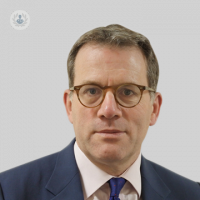Tummy tuck and the possible complications
Written by:Abdominoplasty surgery is a procedure that removes excess skin and fat from the abdomen to give a flatter stomach. But, as with all surgeries, there is a risk of complication. Here, one of our top plastic surgeons Mr Ian Grant explains what to expect after a tummy tuck from recovery time to scarring, and his advice for those trying to decide whether they should have the operation.

What can be expected after an abdominoplasty? Scars? Pain?
Abdominoplasty requires a general anaesthetic and usually takes about two to three hours. Most patients stay in the hospital for one to two nights.
Patients usually report that the pain levels after surgery are moderate and by the second day after surgery readily controlled with oral medication. Some patients feel that their abdomen is initially tight and uncomfortable, particularly if the abdominal wall muscles are sutured closer together to reduce any bulge. This should improve over two to three weeks after surgery.
There is a long scar, which usually runs across the lower abdomen. This can be red and tender for the first month or two after surgery but will fade, and soften over about 12 months.
How dangerous is a tummy tuck?
There have been deaths reported in the medical literature after abdominoplasty surgery, there have, however, been very few in the recent literature. If a patient is healthy, if she is not obese, and she has an experienced appropriately trained surgeon, then the risk of serious injury or death is extremely low.
How long is recovery after a tummy tuck?
I usually ask patients to come for review at one week, two weeks and six weeks after surgery. Most patients can drive and return to work at about three weeks. A return to sport can vary, but most patients can start cycling or using a treadmill at about six to ten weeks after surgery.
What complications might a person face after a tummy tuck?
About 1 in every 4 patients will have a complication. Early complications include bleeding, requiring a return to theatre. Late complications include the accumulation of fluid in the lower abdomen removal using a needle and syringe in the clinic.
Infections are uncommon and can usually be managed with oral antibiotics. Very occasionally they can be more severe causing illness, and a need to readmit a patient for intravenous antibiotics and even further surgery.
The scars from surgery can in rare instances become lumpy and, very occasionally despite careful planning, the scar can be uneven in height. There have been reports of interruption of the blood supply to the abdominal wall skin causing skin necrosis, scarring, and a need for further surgery.
What would you recommend to patients before making the decision to have the operation?
Before considering surgery, reflect upon the fact that 1 in 4 patients has a problem after surgery. The vast majority of these patients get through this with a good end-result and a high level of satisfaction. If you would not cope with a problem or with getting through an unwelcome complication, then do not have surgery.
Ask yourself how important this surgery is to you. If you can achieve changes to your abdomen by exercise and a healthy diet, then save yourself the money, downtime and risk, by avoiding surgery. If you are a smoker or are obese (with a BMI of more than 30) then do not have surgery, you are exposing yourself to unnecessary risk.
If you are however interested in going ahead, then look at the websites of the national associations for plastic surgery to get more information. Find a hospital with a good record of safety, and then look for a plastic surgeon working at the hospital who has expertise in this area.
Do not hesitate to also have a consultation with Mr Grant if you would like to discuss your weight loss surgery options.


